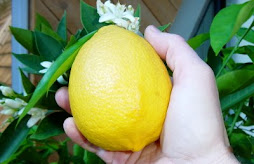In Defense of Food by Michael Pollan is one of my favorite books ever. It's phenomenal. The introduction alone is worth a read. As I read it, I am jumping up and down in my mind, cheering the author on. It's absolutely right on point concerning the evolution of health and nutrition in America and the confusing mess Americans find themselves in today.
One thing Michael Pollan mentions is orthorexia. This really hit home for me. If you don't know already, orthorexia is an unhealthy obsession with being healthy. It's true; obsessing over health can be very unhealthy. We health nuts need to take a step back and ask ourselves: Am I enjoying my food? Check this out:
"What you think about your food is more important than what the food actually is."
Wow! Simple but incredible! So what does this mean to me? It means,
- Do not eat when I am upset.
- Always bless my food and those who prepared it.
- Always be grateful for my food no matter what it is.
Back to Michael Pollan... his books are great. He wrote a little book in 2009 called Food Rules which is basically a quick summary of the conclusions he has reached through his research while writing previous books such as In Defense Of Food
and The Omnivore's Dilemma
.
I am going to share some of his rules here because I think they are important, and it will help all of us be less obsessive over the little things, appreciate more, and still pursue high-quality nutrition. Additionally, these rules apply to all types of eaters: vegan, vegetarian, and omnivore. By following them, we can all relax and be healthier as a result.
- Eat Food. This raises the question, "what is food?" Some of the following rules will help you distinguish between real food and food-like substances.
- Don't eat anything your great-grandmother wouldn't recognize as food.
- Avoid food products that contain more than five ingredients.
- Avoid food products containing ingredients a third-grader cannot pronounce.
- Eat only foods that will eventually rot.
- Eat foods made from ingredients that you can picture in their raw, natural state.
- If it came from a plant, eat it; if it was made in a plant, don't.
- Eat mostly plants, especially leaves.
- Treat meat as a flavoring or special occasion food.
- Eat animals that have themselves eaten well.
- Eat well-grown food from healthy soil.
- Eat sweet foods as you find them in nature.
- Spend as much time enjoying the meal as it took to prepare.
- Breakfast like a king, lunch like a prince, dinner like a pauper.
- Treat treats like treats.
"Eat food. Not too much. Mostly plants."













1 comment:
"Eat only foods that will eventually rot."
That really rings home with me. More than any other food-related behavior, I need to buy more foods that will rot and, especially, eat them before they do! I have a habit of buying large amounts of good food and then forgetting about it or eschewing it in favor of "easier" processed foods.
Veggies like celery and carrots are my friends when it comes to snacking, especially with dips like hummus or (like your last post) peanut butter. :-)
Post a Comment